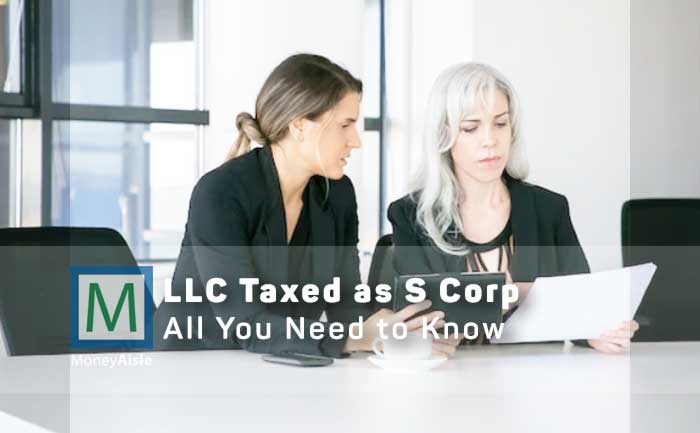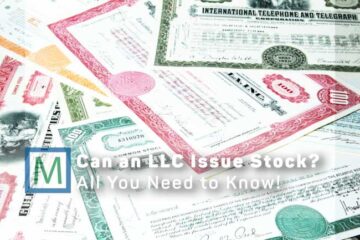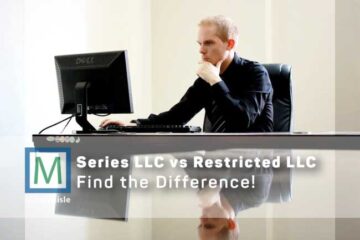If you wish to take advantage of all the flexibilities offered by a Limited Liability Company (LLC) structure and reduce your tax bill as an S corporation, keep reading. To take advantage of the combined features of an LLC and S corporation, many small business owners opt for an LLC taxed as an S corp.
Of all the legal business structures, an LLC offers the most flexibility when it comes to paying taxes. You can learn in detail How LLC is Taxed here.
If you’re like most business owners, the thought of tax season fills you with a sense of dread. But it doesn’t have to be that way. In fact, there are some easy ways to minimize your tax liability and make tax time a breeze. One way to do this is to opt for an LLC taxed as S Corp.
LLC Taxed as S Corp: Explained
How does an LLC Taxed as S Corp work? Here we’ll try to explain everything such as what is S Corp Tax status for an LLC, what are the benefits, how an LLC can elect S Corp Tax status, and how you can save tax by paying LLC Taxes as S Corp, etc.
Moreover, we’ll also explain why and when it is important to choose S Corp taxation for your Limited Liability Company.
Here’s why choosing S Corp tax status for an LLC is the best choice for your business:
Why Should You Choose LLC as Your Business Structure?
An LLC is a popular choice for many business owners because it offers many of the same benefits as a corporation such as registration with the state, limited liability protection, etc. At the same time, LLC gives you more flexibility when it comes to running your company.
IN other words, if the LLC is sued, the owner’s personal assets (home, car, personal account) are protected from seizure. LLCs are also relatively easy to set up and maintain (no exhausting paperwork and meetings).
However, this flexible business structure can be subjected to high tax rates unless you make the right choice for how to pay LLC taxes. By default, a single-member LLC is taxed as a sole proprietorship and multi-member LLC is taxed as a general partnership.
Moreover, an LLC can also opt to be taxed as C Corp or S Corporation. In the following sections, we will discuss how to pay LLC taxes as an S corp and its benefits for your small business.
Benefits for an LLC Taxed as S Corp
Many business owners keep looking for legal ways to keep their hard-earned money in their own pockets instead of handing it over to the IRS. Electing S corp tax status for their LLCs is one of the legal ways to save money on taxes.
If an LLC chooses to pay its taxes as S Corporation, your business will have the following advantages:
- No double taxation as of C corporation
- Save a considerable amount in Self-Employment tax
If LLCs choose to pay taxes as the default structure allows it (taxed as a partnership/sole proprietorship), they are subject to self-employment taxes, which can be a significant disadvantage.
In a partnership/sole proprietorship, the IRS does not consider partners or sole proprietors as employees.
So, even if any or all the partners are employed by the business, they will still be considered the owners. Hence, all the income is passed through the owners and subjected to self-employment tax.
Note: Workers who aren’t self-employed only pay Social Security and Medicare taxes. While entities taxed as partners pay self-employment taxes that are higher than Social Security and Medicare taxes.
So, LLCs that are taxed as a partnership/sole proprietorship pay a 15.3% self-employment tax including 12.4% Social Security and 2.9% Medicare tax. As for the employees, they only pay 1.45% for Medicare and 6.2% for Social Security.
The rest of the tax is paid by employers (6.2% for Social Security and 1.45% for Medicare). Self-employed people such as in LLCs taxed as a partnership pay both halves (the employee’s and employer’s part of the tax).
On the other hand, corporate income is treated as a dividend instead of earnings. If LLC elects to pay its taxes as a C Corporation, it will be subjected to double taxation: one on the owners’ level and one on the corporate level.
However, S corporations do not pay corporate tax rates. Instead, an S Corp is a type of corporation that has elected to be taxed as a pass-through entity. This means that the corporation’s income is passed through to its shareholders, who then report it on their personal tax returns.
So, if an LLC elects to be taxed as S Corporation, some of the business profits will be passed through as earnings, and the other profits will be considered dividends. Since the dividend is not subjected to Social Security and Medicare taxes, LLC can save much on the self-employment tax.
Example of How LLC Taxed as S Corp Helps You Save on Tax
Let’s suppose, your business is operating as an LLC and you are the sole owner of your LLC. Moreover, you are taking care of all the affairs of your LLC by yourself. Here is how you will be taxed.
If you received $120,000 as the salary of an LLC employee and $140,000 in net LLC income. By default, all $260,000 will pass through you as self-employment income. So, in addition to income taxes, you have to pay a 15.3% self-employment tax which is $39,780 in the above-mentioned case.
However, if your LLC has elected to be taxed as an S corporation, you will only have to pay self-employment tax on $120,000 which is your earnings as a self-employed individual. The net income of your LLC ($140,000) will be distributed as a dividend which is not subjected to self-employment tax.
Hence, you will pay $18,360 (15.3% of 120,000) in self-employment tax. This is how paying LLC taxes as S corp helped you save $21,420.
How LLCs can Elect S Corp Tax Status
As we have discussed earlier, an LLC can pay its taxes as:
- A partnership,
- A corporation (S Corp or C Corp),
- A disregarded entity (separate from its owner).
All LLCs that wish to elect themselves as S corporation need to file Form 2553 with the IRS.
Note: For LLCs electing as an S corporation, there is no need to file Form 8832 (to elect classification as a corporation) before filing Form 2553.
After Filing Form 2553, S corporation laws will be applied to the LLC. For tax purposes, these LLCs need to file Form 1120-S, U.S. Income Tax Return for an S Corporation. The pro-rata share of corporate income, deductions, and credits of each owner will be reported on Schedule K-1 (Form 1120-S).
Conclusion:
Whether you choose to pay your LLC taxes as S Corp, partnership, C Corp, or disregarded entity, each option has its own benefits and downsides. We suggest choosing a Tax structure that gives maximum benefits to your LLC under your specialized circumstances and future goals.
We hope this LLC Taxes as S Corp guide has helped you understand whether electing S Corp status will be beneficial for your LLC or not.

Aisha Noreen is an owner of a small business with more than 9 years of experience in the marketing industry. With the wisdom of an old soul, she always seeks innovation and mind-blowing ROI techniques. Her unique approach helped many small businesses thrive and she can surprise you in many ways as well. Believe it or not, her energy, passion, and creativity are contagious enough to transform your business and take it to another level.








